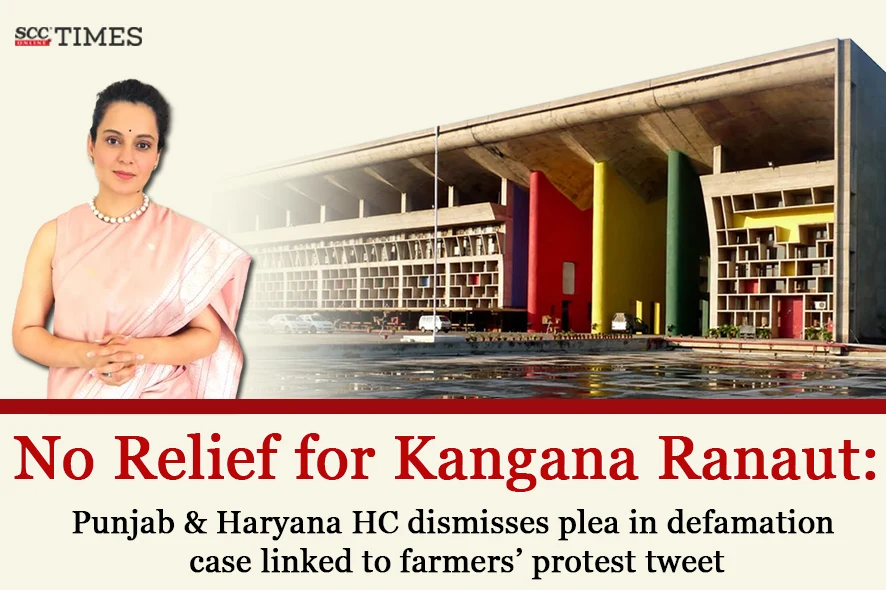Punjab and Haryana High Court: In a petition filed by Kangana Ranaut under Section 482 of the Criminal Procedure Code, 1973 (‘CrPC’) seeking quashing of criminal complaint filed by the complainant under Sections 499 and 500 of the Penal Code, 1860 (‘IPC’), a Single Judge Bench of Tribhuvan Dahiya J. dismissed the same and stated that she failed to demonstrate how her retweet was made in good faith.
Background
In the present case, the complainant belonged to an agricultural family, and income from agriculture was their only source of livelihood. Following the enactment of certain new laws by the Central Government concerning agriculturists, farmers in the States of Punjab and Haryana staged widespread protests. The complainant’s family actively participated in these protests under the banner of various farmers’ unions. Despite her advanced age, the complainant also travelled to Delhi to take part in the agitation. However, Kangana made a retweet consisting of her own comment about the complainant, i.e, “Ha ha ha she is the same dadi who featured in Time magazine for being the most powerful Indian…. And she is available in 100 rupees. Pakistani jurno’s have hijacked international PR for India in an embarrassing way. We need our own people to speak for us internationally”. Along with the retweet, she had also shared someone’s tweet carrying the complainant’s photograph.
Thus, a defamation complaint was filed in the Court of Judicial Magistrate First Class, Bathinda. The statement of the complainant was recorded in preliminary evidence. The report from the Director, Twitter Communications India Pvt. Ltd. (‘TCIPL’) as to whether the alleged tweet has been made by Kangana or not was called for. However, the report wasn’t received. Upon hearing the complainant, she was summoned.
Kangana contented that she made the retweet in good faith, without any intention to harm the complainant’s reputation, the mens rea was absent. Further, she was entitled to the benefit of Ninth and Tenth Exception to Section 499 IPC which was not even looked into by the Magistrate on the ground that it could not be done at the time of issuing process. Further, it was also contended that the summoning order was not sustainable as it was violative of Section 202 of the CrPC. Furthermore, it was contended that the complaint was mala fide as the complainant had chosen to file it only against Kangana and not the person whose tweet she had re-tweeted.
Analysis and Decision
Considering Section 202 of the CrPC, the Court held that out of the two options available under Section 202 of the CrPC., i.e., either to inquire into the case himself or direct investigation by a police officer or any other person, the Magistrate opted for the former and after due application of mind took cognizance of the offence vide the impugned order. Before calling for a report from the company’s Director, it was not recorded that the preliminary evidence was insufficient to issue process. This makes it apparent that the report was called only to facilitate the inquiry.
After examining the Ninth and Tenth Exception to Section 499 of the IPC, the Court held that in the present case, the Magistrate was mandatorily required to consider whether these Exceptions were attracted in her case. However, further stated that there was no explicit bar on the Magistrate precluding him from considering whether any of the Exceptions protected Kangana to be summoned but such non-consideration by itself would not render the order issuing process illegal. The Court observed that it was not a case that the complaint, supporting documents as well as the statements of witnesses before the Magistrate established that Kangana was entitled to the benefit of Ninth and Tenth Exception to Section 499 of the IPC.
The Court further opined that Kangana could not show even prima facie as to how imputations in the retweet could be said to have been made by her in good faith for protection of her own interest or of anyone else, nor could it be said for public good.
The Court also said that merely because the Magistrate wrongly mentioned the Kangana’s retweet as tweet in the impugned order, it could not be said that the order was a result of non-application of mind.
Furthermore, the Court held that just because the complainant had filed a complaint only against Kangana and not against the person to whom the original tweet was attributed to, in itself could not be a ground to contend that the complaint was mala fide.
Therefore, the Court dismissed the petition.
[Kangana Ranaut v. Mahinder Kaur, 2025 SCC OnLine P&H 4861, decided on 1-8-2025.]
Advocates who appeared in this case :
For the Petitioner: Abhinav Sood, Advocate, Anmol Gupta, Advocate, Achintaya Soni, Advocate, Mehndi Singhal, Advocate, Dhruv Chowfla, Advocate, and Nitesh Jhajhria, Advocate
For the Complainant: G.K. Mann, Senior Advocate, Aditya Dassaur, Advocate, and Armaan Sandhu, Advocate




